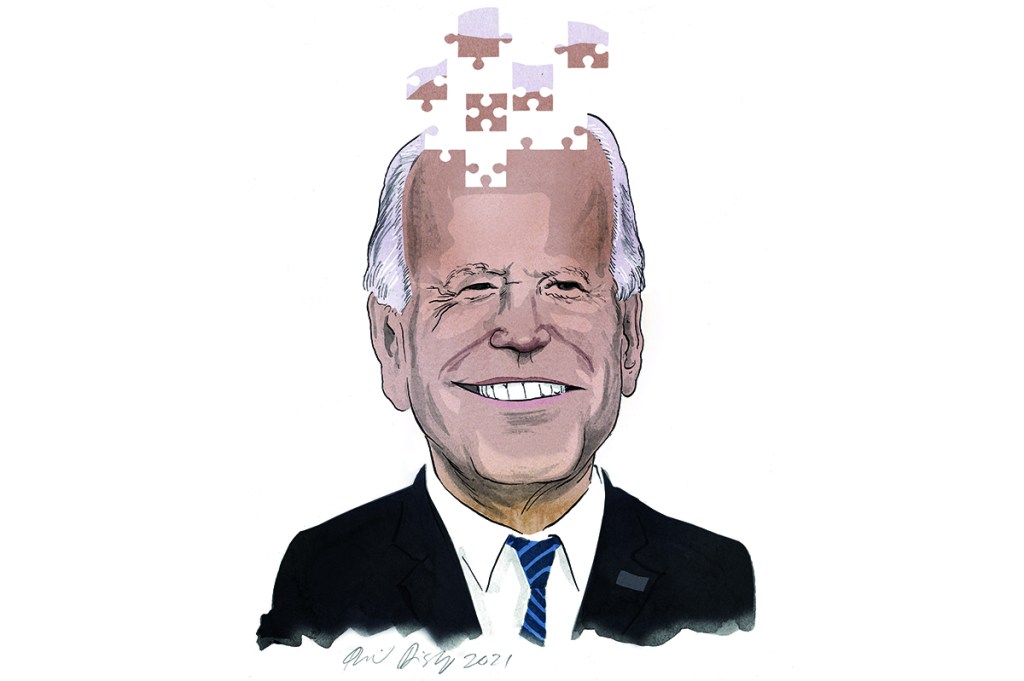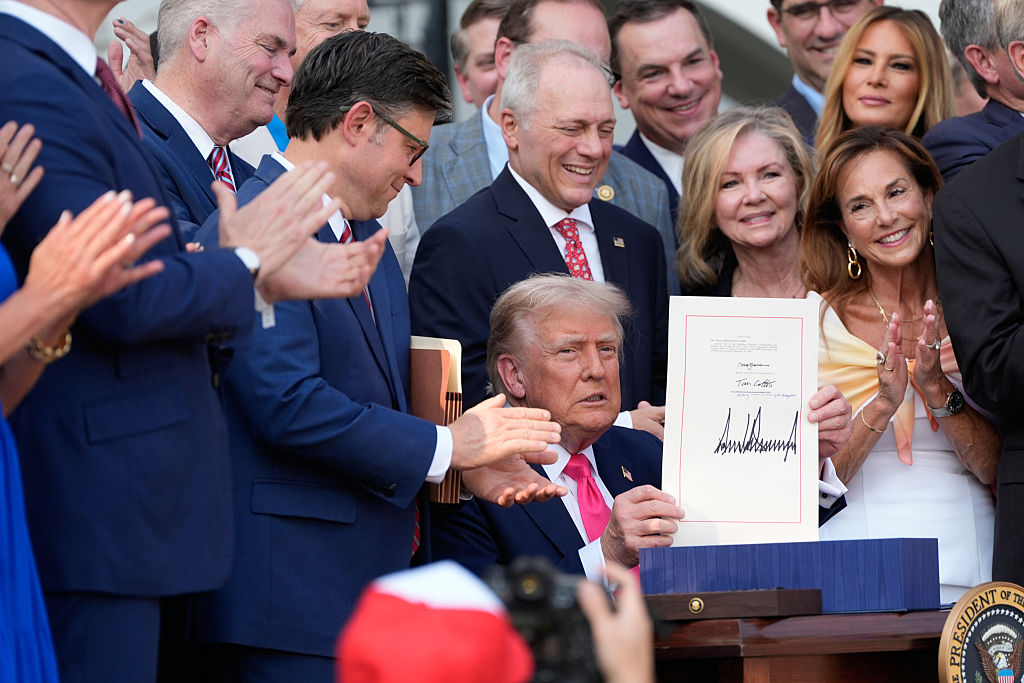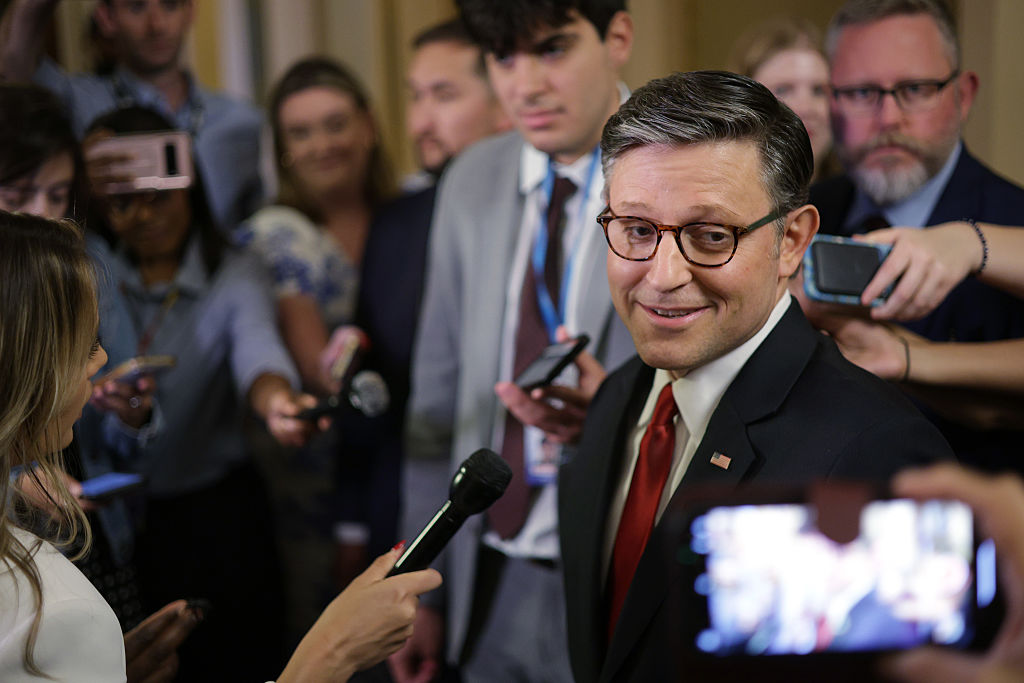Delaware used to be Cale Boggs country, almost as much as Massachusetts belonged to the Kennedys. Boggs served as governor, congressman and twice as Delaware senator, so in late 1972, when he was seeking a third term, the race looked sewed up. But as summer turned to fall, his 28-point lead evaporated. Voters started paying attention to Boggs’s rival, a Democrat youngster with fire in his belly and a spring in his step.
Anti-Boggs ads said his best days were behind him. According to his fresh-faced opponent, Boggs was a ‘helluva nice guy’ but, after decades in power, he had ‘lost that twinkle in his eyes’. On election day, Boggs lost by a margin of 3,000 votes. The people of Delaware sent to Washington a 30-year-old thruster named Joe Biden.
President Biden turns 79 this November. Perhaps it is time to ask if his blue eyes still twinkle with the same luster that swung Delaware half a century ago. The presidency is, after all, the hardest job on earth. It combines and compounds the worst attributes of every other unenviable profession: the job security of a cartel boss, the demands of being Anna Wintour’s personal assistant, and the global responsibilities of Batman. Two terms in the Oval Office turned Barack Obama’s hair gray, and he was only 47 when he was elected. Imagine the toll it will take on Biden, the oldest man ever to serve as president.
Modern presidential history can be measured in sobering medical records. Harding, Eisenhower and LBJ all had heart attacks in office. Wilson had a stroke, and FDR died of one. After returning to civilian life, George W. Bush had a stent inserted. Bill Clinton had quadruple bypass surgery. Ronald Reagan was diagnosed with Alzheimer’s.
Biden, we know from a 2019 medical assessment, maintains a healthy lifestyle. He doesn’t smoke or drink alcohol, and he exercises five days a week. But in 1988 he suffered two brain aneurysms, one of which hemorrhaged and had to be repaired surgically. This led to complications like deep vein thrombosis and pulmonary embolism. The long-term effects of brain aneurysms can include difficulty in speaking and lack of coordination, and may also extend to the premature onset of dementia. Biden’s health assessment tells us he has not experienced any recurrence of brain aneurysms, and concludes that he is a ‘healthy, vigorous’ man capable of shouldering the burden of the presidency.
Given Biden’s age, his medical history and the realities of the job, you might be forgiven for thinking that the president’s health could be discussed out of genuine concern, rather than partisan malice. Yet most of the media has tried to rule this conversation out. CNN’s Chris Cillizza sniffed in August that such conversations were ‘gross, lowest-common-denominator politics’ and should cease ‘immediately’.
A principled stance to be sure, but it might mean more if it were applied across the political spectrum. Only last year, Cillizza tried to glean insights about Donald Trump’s health from footage of him slowly descending a ramp. Over at MSNBC, anchors and commentators frequently tried to examine the presidential brain. ‘It’s clear that there is something wrong,’ Rachel Maddow said in May 2020 after Trump hosted a slightly more turbulent press conference than usual. Trump, she said, appeared ‘visibly unwound’. Her colleague John Heilemann claimed Trump showed signs of ‘advanced dementia’.
It is doubly curious that the pundit class should rule out discussion of Biden’s health when he has previously invited it. As recently as 2018 — which to some talking heads may feel as historically distant as Delaware’s senatorial election of 1972 — Biden told voters it was ‘totally appropriate’ to wonder if he was ‘too old’ for the presidency, and implied there’s many a good tune played on an old fiddle.
‘Well, chronologically, I am old,’ he quipped.
It might seem implausible now, but questions about Biden’s stamina and mental acuity also used to come from his own party. At a primary debate in 2019, Julián Castro, the former HUD secretary, needled Biden for fumbling an answer: ‘Are you forgetting already what you said just two minutes ago?’ Cheers and applause erupted in the audience.
New Jersey senator Cory Booker tagged in for Castro, adding, ‘There are a lot of people who are concerned about Joe Biden’s ability to carry the ball all the way across the end line without fumbling.’ Booker stopped short of saying that Biden was feeling his years, but did wonder if he was prone to ‘meandering in his speech’. (Teams Booker and Castro did not respond to a request for comment.)
Are we to believe that Trump’s verbal slip-ups and physical gaffes were proofs of advanced decrepitude, but Biden’s are something else? Republican lawmakers such as Bill Hagerty, Rick Scott and Lauren Boebert have confidently declared that Biden is losing his grip on reality. A handful of medical professionals also suspect the president’s mental faculties are not as sharp as they were. Dr Amit Bajaj, associate professor of speech science at Emerson University, thinks Biden’s cognitive strength may be slipping due to old age. Interviewed by the Daily Mail, he suggested that Biden’s errors of speech might reflect ‘cognitively where he might be at, because he is old’. Ronny Jackson, a former White House doctor turned Republican representative, has said Biden’s abilities were crumbling ‘right before our eyes’. Then again, when Dr Jackson assessed Donald Trump, he raved about Trump’s ‘incredibly good genes’ and joked that if Trump ate more healthily, he might live to 200.
Biden has long had a reputation for putting his foot in his mouth — by his own admission, he is a ‘gaffe machine’. To judge by his recent record, his toes must be somewhere deep in his esophagus. On the campaign trail, he called his son the attorney general and mistook his wife for his sister. Super Tuesday became Super Thursday, he was running for senator instead of president, and the voters of New Hampshire were surprised to hear from Biden that they were living in Nevada. Biden was confused about the number of US coronavirus deaths. He called one voter ‘full of shit’ and another a ‘lying dog-faced pony soldier’. More recently, he seemed to forget secretary of defense Lloyd Austin’s name, and the name of the Pentagon. In September, he promised a zero-emissions energy policy — by 2020 – and called Australia’s prime minister Scott Morrison ‘that fellow Down Under’.
We should be wary of selection bias: the clips of Biden’s mistakes are a fraction of what he says. And some incidents have been exaggerated. In August, footage of Biden’s first meeting with Naftali Bennett was selectively edited and shared on social media to give the impression Biden had nodded off as the Israeli prime minister was talking. But it is hard to believe that the Maddows and Cillizzas, or the Pelosis and Schumers, would not have made hay out of these moments if they involved Trump. When Trump tweeted ‘covfefe’, his enemies called for the 25th Amendment.
Concern for the presidential mental state has subsided since its Trumpian peak. In 2017, 27 psychiatrists and mental health experts collaborated on a book calling for the ‘very stable genius’ to be removed on mental health grounds. The Dangerous Case of Donald Trump argued that the danger Trump’s alleged mental instability posed to America was so great that the authors could ditch the so-called ‘Goldwater Rule’, which holds that long-distance diagnosis is unethical.
I contacted the psychiatrists who contributed to the book if they would apply their arguments to Biden. Their responses show a firm consensus. Dr Luba Kessler, who wrote a chapter in The Dangerous Case, says Biden is a man of ‘mental vigor, resilience and solid reasoning capacity’. Dr David Reiss, whose chapter discussed signs of dementia in Trump, says he had ‘not observed any indication that there is any reason for concern regarding Biden’s mental health’. Dr Reiss, we can presume, is not a regular watcher of Fox News. Dr Edwin Fisher tells me he sees ‘no comparable concerns’ between Biden and Trump.
Psychologist Craig Malkin explains that the president’s ‘disfluency’ — stammering, substitutions and unusual cadence — is more likely a result of his stutter, and not a sign of dementia. If Biden were suffering from the onset of dementia, Dr Malkin says, he would also be displaying obvious problems like ‘disorientation to time, place and person’, mixing up names or forgetting which state he was in, for instance.
These authors agree that the signs of severe personality disorder they detected in Trump are not present in Biden. But a fifth, Dr Howard Covitz, demurs. ‘At nearly 80, it is unextraordinary that his speed of processing is likely slowed and word retrieval may be impacted around the edges,’ Covitz says. ‘That, in and of itself, does not bode poorly for his ability to put together a responsible executive administration or to execute the needs of government leadership.’
If Biden’s twinkle is indeed fading, it seems only sensible to talk about it. We don’t need to overhype it — but we also should not ignore it. As Biden did with Boggs back in 1972, why can’t we talk about it in good faith?
This article was originally published in The Spectator’s November 2021 World edition.

























